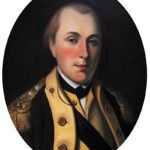Our months draws to a close on a day of partly cloudy skies and a high of eighty-two. Sunrise is 5:46 AM and sunset 8:15 PM for 14h 28m 55s of daytime. The moon is a waning crescent with 6.7% of its visible disk illuminated.
Friday’s FW poll asked if readers thought that dyeing a dog’s fur to look like Pikachu was a good idea. About 3 of 4 (74.07%) respondents said that it wasn’t.
On this day in 1777, Lafayette receives a commission from Congress:
The young Marquis de Lafayette wears the uniform of a major general of the Continental Army. Painting by Charles Willson Peale.
Marie-Joseph Paul Yves Roch Gilbert du Motier, Marquis de Lafayette (…6 September 1757 – 20 May 1834), in the U.S. often known simply as Lafayette, was a French aristocrat and military officer who fought in the American Revolutionary War. A close friend of George Washington, Alexander Hamilton, and Thomas Jefferson, Lafayette was a key figure in the French Revolution of 1789 and the July Revolution of 1830….
On arrival, Lafayette met Major Benjamin Huger, a wealthy landowner, with whom he stayed for two weeks before going to Philadelphia. The Continental Congress had been overwhelmed by French officers recruited by Deane, many of whom could not speak English or lacked military experience. Lafayette had learned some English en route (he became fluent within a year of his arrival), and his Masonic membership opened many doors in Philadelphia. After Lafayette offered to serve without pay, Congress commissioned him a major general on 31 July 1777.[29][30] Lafayette’s advocates included the recently arrived American envoy to France, Benjamin Franklin, who by letter urged Congress to accommodate the young Frenchman.[31]
General George Washington, commander in chief of the Continental Army, came to Philadelphia to brief Congress on military affairs. Lafayette met him at a dinner on 5 August 1777; according to Leepson, “the two men bonded almost immediately.”[32]Washington was impressed by the young man’s enthusiasm and was inclined to think well of a fellow Mason; Lafayette was simply in awe of the commanding general.[32] General Washington took the Frenchman to view his military camp; when Washington expressed embarrassment at its state and that of the troops, Lafayette responded, “I am here to learn, not to teach.”[33] He became a member of Washington’s staff, although confusion existed regarding his status. Congress regarded his commission as honorary, while he considered himself a full-fledged commander who would be given control of a division when Washington deemed him prepared. Washington told Lafayette that a division would not be possible as he was of foreign birth, but that he would be happy to hold him in confidence as “friend and father”.[34]

